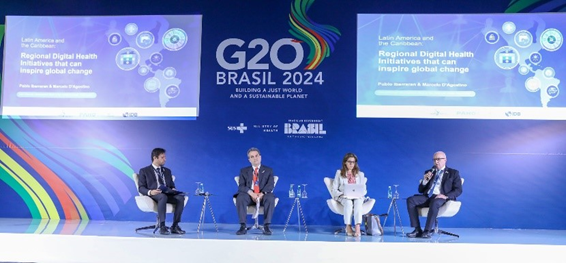
Salvador, Bahia, Brazil, 4 June 2024 (PAHO) - The Pan American Health Organization (PAHO) has recently emphasized the transformative potential of artificial intelligence (AI) for achieving equitable public health at the G20. In an editorial led by PAHO Director, Dr. Jarbas Barbosa, and published in the Pan American Journal of Public Health, the authors explore how AI can revolutionize health systems and services across the globe. Utilizing AI's capabilities, such as predictive analytics, biosignal processing, and robotics, the G20 aims to enhance health outcomes, increase operational efficiency, and ensure innovation in public health practices.
"AI holds immense potential to bridge health disparities, particularly for underserved populations," explained the authors. "Through the G20's influential platform, we can foster international collaboration, share knowledge, and support global standards that prioritize AI integration into public health."
Key elements of AI in public health highlighted in the editorial include:
Enhancement of Diagnostic Capabilities: AI-driven technologies, like computational vision and natural language processing, improve diagnostic accuracy and streamline patient communications.
Personalized Care: Precision medicine uses AI to tailor treatments to individual genetic profiles, enhancing effectiveness and outcomes.
Resource Optimization: Predictive analytics and big data empower public health officials to anticipate health trends and allocate resources efficiently.
Operational Efficiency: Robotics and AI-driven tools optimize surgical procedures and rehabilitation, improving patient outcomes and operational efficiency.
Patient Engagement: Chatbots and conversational virtual assistants provide real-time information and support, enhancing patient engagement and compliance.
The editorial also addresses the challenges and ethical considerations in AI adoption:
Anthropomorphization and Overreliance: The risk of unrealistic expectations and overreliance on AI for critical health decisions.
Bias and Health Disparities: The potential for biases in AI training data to perpetuate existing health disparities.
Misinformation and Hype: The need to manage the mediatization of AI to prevent misinformation and unrealistic hype.
To mitigate these challenges, the G20 advocates for ethical AI principles, ensuring that AI solutions are people-centered, transparent, and nondiscriminatory. "It is essential to establish robust ethical guidelines and regulatory frameworks to ensure the responsible and equitable adoption of AI in public health," stated the authors.
PAHO's Contributions:
PAHO is actively supporting the G20’s AI initiatives by promoting national and regional actions that:
Develop Tailored AI Strategies: Based on digital health infrastructure and readiness.
Facilitate Knowledge Exchange: To amplify AI adoption in public health.
Establish Ethical Guidelines: Ensuring responsible and equitable AI implementation.
Ultimately, the editorial underscores the need for diverse data sets to provide equitable health outcomes. The G20's commitment to ethical AI development, supported by PAHO, will drive forward initiatives that improve global health outcomes and ensure technological advancements benefit all populations equitably. For more detailed information, you can access the full article here.
The PAHO/WHO Information Systems and Digital Health Unit (IS) of the Department of Evidence and Intelligence for Action in Health (EIH) is leading PAHO’s Technical Cooperation on Artificial Intelligence and Public Health. Its Unit Chief, Mr. Marcelo D’Agostino, was invited by the G-20 Presidency to present PAHO’s vision and actions on this important topic.




